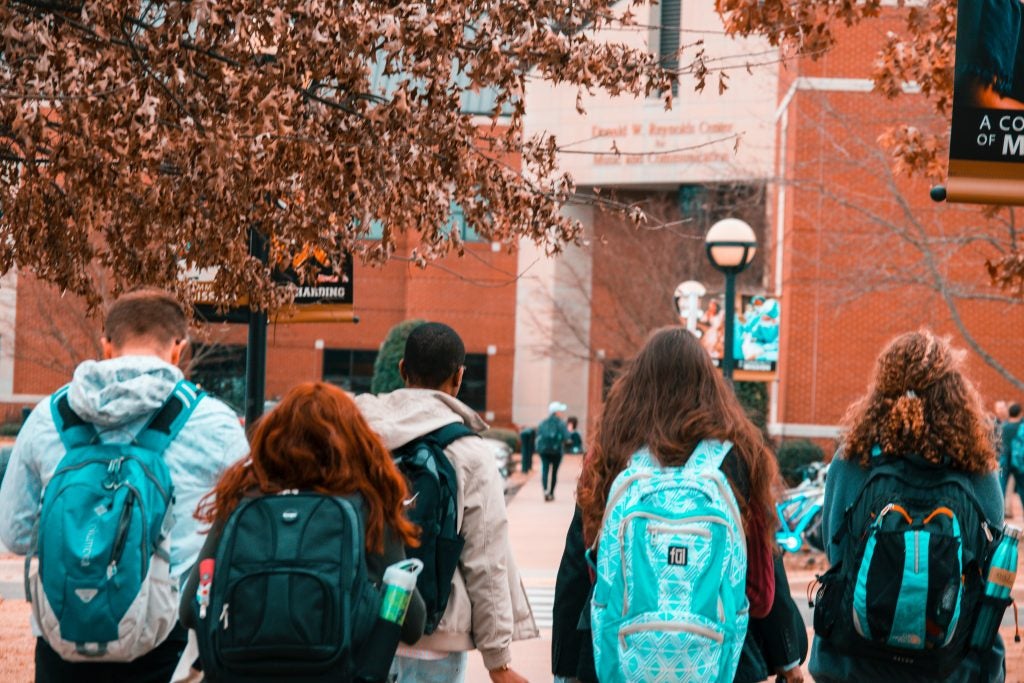Module 4: College Resources (Part 1)
Campus Resources
Introduction
Objective: The student will identify at least 3 campus resources available on most college or university campuses that will be useful in his or her personal situation.
This lesson is designed to help you learn about campus resources that may be important to you throughout your college career.
Estimated time 30—45 minutes
Materials included:
Materials needed:
- Transition Notebook from Module 1 Part 2
Curriculum Link:
This section corresponds with Module 4 Lesson 1 in the College Bound Transition curriculum resources.
Learn About It

Campus resources can generally be divided into 3 categories:
- Academic Resources
- Housing, Dining, and Transportation Resources
- Student Organization Resources
What are Academic Resources?

This category includes resources that benefit students academically. The types of resources are fairly standard, but details vary from school to school.
Academic resources include (but are not limited to):
- Library
- Tutoring, including general and subject-specific centers
- Advising
- Career Center
- Information Technology & Computing
- Registrar
- Study Abroad
As we look more closely at these types of resources, keep in mind that the services that we mention will vary from campus to campus. Those listed are reasonably common offerings.
Academic Resources: Library Services
The library is an important resource that sometimes isn’t used enough by students. Many students don’t realize the depth and breadth of the services their library offers and are surprised to find support available for things they might not expect.
- Traditional library services (e.g., lending books and other materials, reference services)
- Library databases
- Study environments
- Technology (e.g., Kindle, laptop)
- Research assistance
- Writing assistance (such as figuring out a good paper topic)
- Citation resources (generating the citations needed to correctly reference sources in papers)
- With current technology, many library resources can be accessed remotely. You may be able to use many of the library’s services from your dorm room or apartment.
Academic Resources: Tutoring

Tutoring centers offer many resources to aid you in understanding. They are not only to be used when you are having difficulty in a class. Some of the most successful students use them proactively to run through and review main ideas from recent classes. Tutoring is tailored for your individual needs. Offerings could include:
- One-on-one tutoring
- Group sessions
- Academic workshops
- Study skills training
- Tailored academic support
- Referrals to additional tutoring/academic resources if you need support beyond what they offer.
East Carolina University’s Pirate Tutoring Center. Note: The PCC has changed their name to the PASC (Pirate Academic Success Center).
Academic Resources: Subject-specific Tutoring Centers
Many subject-specific tutoring center services are similar to the services available in general tutoring centers (e.g., individual appointments, workshops).
A Writing Center may help you with
- Grammar
- Selecting and developing topics
- Writing specific parts of a paper (e.g., thesis, transitions)
- Formatting and style.
A Math Lab may help you to
- Understand concepts
- Complete practice problems.
A Foreign Language Resource Center may provide
- Assistance translating vocabulary and learning language structure
- Practice speaking the language
- Resources to understand and appreciate a foreign culture
- Physical resources such as dictionaries, software, and workbooks.
Academic Resources: Using College Tutoring Centers
Tutoring is for everyone, not just students who struggle. Tutoring is a resource to keep your grades up so you won’t need to bring them up.
Expectations and guidelines for college-level tutoring:
- Show up prepared, both physically (bring all materials you may need: syllabus, book, notes, laptop, flash drive) and mentally (be sure you have gone to class, listened attentively and taken notes).
- Study independently before tutoring: make a genuine effort to understand the material, read and review materials, and complete practice problems beforehand).
- If possible, bring specific questions about the material (know what you do and don’t understand, and be prepared to articulate specifically where you need help and what it is about the topic that’s confusing you).
- Actively participate. Use active listening and critical thinking skills to interact with the tutor; don’t sit back passively and wait for knowledge to be spoon-fed to you.
- Don’t wait until the last minute to attend tutoring. Last minute tutoring is great for clarifying a few points or getting in one more guided review, but not for cramming or learning entire concepts.
| Tutors DO: | Tutors DO NOT: |
|---|---|
| Troubleshoot and clarify concepts that you didn’t understand during the first encounters with the material. | Re-teach entire lessons or concepts. |
| Work through material with you and guide you toward the answers. | Work through material for you or give you the answers. |
| Help you understand and apply concepts and complete problems similar to those on graded assignments. Explain concepts related to online quizzes or tests. | Directly help you answer specific problems or questions on graded assignments or online quizzes and tests (especially in math). The exception to this is writing assistance. Writing tutors will generally provide direct help with your paper even though it will be turned in for a grade. |
Parents Chime In
- Review the use of tutoring in college and the specific types of tutoring offered.
- Compare the use of tutoring in high school to the use of tutoring in college. Talk about any positive outcomes that your student may have experienced from using tutoring in high school.
- Emphasize how using tutoring proactively can help a student be successful in college.
Academic Resources: Academic Advising

Advisors help you to:
- Understand academic requirements and plan your course of study
- Select, schedule, and register for classes (in most cases they do not directly register you; that is your responsibility)
- Monitor your academic progress
- Interpret and follow academic guidelines
- Locate other resources needed to meet goals.
Types of advisors:
- General (or pre-major) advisors work with you before you enter a major/degree program. They are trained to help you mostly through the process of completing foundational/core requirements along with all the other roles listed above. They also often have a working knowledge of most of the campus’s degree programs, so they can help guide you toward declaring a major.
- Major advisors have specialized knowledge about a major/degree program. You’ll start working with these advisors once you have decided what program to enter. Although major advisors share some of the same advising roles as general advisors, they may be more focused on the issues that apply specifically to students in their own department.
- Students who are majoring in something but also working toward a “pre-professional” track in order to attend a specialized graduate school (e.g., pre-law or pre-med) may have a pre-professional advisor who helps them meet these requirements. Alternatively, their major advisor may help with that.
- Every university has its own way of organizing advisors, so check how the school that you are interested in assigns advisors.
Academic Resources: Information Technology & Computing

This group manages campus technology and related services. Services include:
- Support with troubleshooting personal computer hardware and software issues
- Selection and support for academic software
- Student email
- File storage
- Workshops and training
- Internet safety and security
- Campus computer labs
- Online courses or online course content support
- Campus servers and networks (e.g., wifi).
Academic Resources: Career Center
Career centers on the college campus are an excellent resource for students. This is not just an office for seniors. Freshmen can benefit from their services too. The Career Center might offer:
- Help throughout college, not just as you are graduating
- Events and workshops on topics such as choosing a major, finding your personal skill set, career conversations, and finding internship opportunities
- Career counseling
- Extensive career resources, including resume-building help, job fairs, mock interviews, and workshops on the interviewing process
- Alumni support
You have to take the initiative to find the career center and take advantage of the services they provide.
Once you graduate, you can still be involved with the career center through its job opportunities network and database by participating in workshops on subjects such as changing careers, wading through human resources, and building resumes and cover letters). The career center may also provide help for students applying to graduate school.
Academic Resources: Registrar
The registrar is the university official (or department) responsible for maintaining records on all students and academic policies. Services and responsibilities provided by the registrar include:
- Academic record-keeping on all students
- Issuing grades
- Filling transcript requests
- Assigning classroom/meeting space
- Certifying degree requirements and issuing degrees.
Academic Resources: Study Abroad Programs

Study abroad programs are educational programs in other countries offered by a student’s home school (not a traditional academic resource).
- Opportunities vary by university
- Programs might exist in various countries and at several different host institutions
- Living arrangements vary (e.g., dorm, host family)
- Options for length of program may include summer, semester, or year
- Students may receive academic credits for participating
- Costs will vary depending on school, program, location, etc.
- Courses are usually offered in the student’s native language.
Transportation Resources: Campus Transportation
Most campuses offer various forms of transportation for students:
Buses
- Good option if you live on campus or off campus
- Safe and reliable way to travel
- Most require a campus ID
- Typically make multiple stops in a city, including grocery stores, shopping centers, and apartment complexes.
Bikes
- Efficient and cost effective
- Convenient.
Personal parking for vehicles
- Parking for freshmen is often limited
- Stickers or parking passes are usually required on campus
- Prices and parking areas vary by campus.
Car-sharing or short-term car rental (e.g., Zipcar)
- Service for students who only need intermittent access to a vehicle
- Availability, rates, and restrictions vary per campus.
Ride-sharing
- Social networks that help students find or offer rides within a community or university (e.g., Zimride)
- Decreases traffic and parking problems, helps the environment, and reduces travel costs.
Dining Resources: Campus Dining
Most campuses have a variety of dining options that include:
- A wide variety of foods for all types of palates
- Cafeteria-style as well as à la carte dining.
Your campus’s options might include chain restaurants (fast food or sit-down), coffee shops, smoothie bars, snack shops, and mini-markets.
Many students are enrolled in a meal plan:
- Small, medium, and large meal plans are available for cafeteria use only
- An additional debit-style card may be available for use at any dining facility on campus (money can be added to the debit card at any time)
- The meal plan may only include dining halls or may include other dining facilities.
Campus dining services may also hold social events such as “Midnight Breakfast.”
Student Organization Resources: Extracurricular Activities
Check out the video on Why Involvement in College Matters to learn more about the importance of getting involved on campus.
No matter what interests you, most campuses host lots of opportunities to have fun! These opportunities can play an integral role in your college experience. Participation increases your interaction with other students, and it may lead to increased learning and engagement in the college setting.
Your peer group may be the most important influence upon your academic and personal development. Student organizations are diverse but have some characteristics in common. Extracurricular student organizations and activities:
- Include any non-academic activity or organization
- Feature a diverse range of extracurricular activities
- Invite participation that helps to develop the “whole student.”
Students may have many possible purposes for getting involved:
- Entertainment and enjoyment
- Socialization; meeting friends; networking
- Gaining and improving skills
- Desire to volunteer or to serve others
- Resume-building (future employers may look for involvement in extracurricular activities because it shows a well-rounded individual who is able to balance work and pleasure).
*Information taken from http://education.stateuniversity.com/pages/1855/College-Extracurricular-Activities.html
Types of Student Organizations and Extracurricular Activities
Academic, professional, and honorary: Assist their members in gaining experience in their chosen occupational field, and aid members in their job search. Students meet to discuss pertinent issues related to their field of interest and to learn job-related skills in preparation for future success.
- Groups related to a specific major/field (e.g., the American Marketing Association, the Student Education Association, and the Mathematics Society)
- Professional membership groups
- Academic honors groups.
Leadership: One of the most widespread types of extracurricular experience available on college campuses is student government. Students involved in governance organizations, such as student government and residence hall government, are typically elected by their peers to function as the “official voice” of students to university administration.
Functions of these organization include allocating funds to other organizations, planning programs related to student interests, providing forums for discussion of student issues, and helping to build and sustain a successful campus community.
These organizations may provide leadership on campus or in the community.
Additional examples of campus governance organizations include honor councils, which seek to enforce a university’s honor code, and judiciary boards, where students hear disciplinary cases and render verdicts.

Greek Life: Fraternities and sororities
- Support social opportunities
- Promote service and leadership
Honorary societies: Recognize student scholars, often in a certain academic discipline, who maintain a specific grade point average.
Service, Volunteering, & Activism: Exist to help improve the local and worldwide community.
- Some service groups place volunteers within the university or local community.
- Service-Learning programs combine education with service, offering students an opportunity to contribute to their community and to critically reflect upon service experiences.
- Related services include volunteer databases (where you can add your name to be informed of opportunities on campus), service trips, and advocacy (helping you to explore ways to work with others on the topic of social change).
- In Alternative Spring Break programs, students engage in community service projects, such as rebuilding homes, tutoring students, or planting trees during their college spring break.
- Additional service projects and organizations function throughout the year, including Alpha Phi Omega, Habitat for Humanity, and Circle K, which promotes service and volunteerism during the college years.
The arts: Music, dance, theatre, visual arts, etc. Examples include:
- Performing arts groups, which host activities including plays, musicals, dance concerts, marching band, jazz band, orchestra, and singing groups
- Fine-arts related interest or appreciation groups and events.
Student media organizations: Print, television, and radio venues such as:
- Campus newspaper
- Yearbook
- Campus television and radio stations
- Literary, art, and other publications.
Faith-based organizations:
- Groups for specific organized religions or interfaith groups
- Spiritual or philosophical organizations
- Atheist/agnostic groups.
Specific interests:
- Political organizations
- Groups for hobbies or activities (e.g., paintball, anime, scuba diving, poetry, comedy, board games, motorcycles, bowling)
- Health or wellness (e.g., substance-free lifestyle).
Athletics: Almost every college and university in the United States offers some type of intercollegiate and intramural athletics.
Varsity sports:
- Well-organized, highly competitive
- Subject to rules from national organizations such as NCAA; professional leadership
- Large commitment of time and energy for practicing, conditioning and competing.
Club sports:
- Organized and competitive, but less so than varsity sports
- Fewer restrictions and rules; leadership may be student or professional
- Less time commitment than varsity sports but more than intramurals.
Intramural sports:
- Provide an opportunity for all non-varsity student athletes to play a sport they enjoy, while competing against their peers
- Level of organization and competition varies drastically; many are “just for fun”
- All skill levels are invited to participate
- Governed by much more lax rules; leadership is usually from students
- Usually minimal time commitment.
Athletic Boosters and school spirit organizations: For students who particularly enjoy watching collegiate sports, many schools have student spirit organizations that allow students to attend sporting events, sit in a special student cheering section, and applaud the home team.
*Information taken from https://education.stateuniversity.com/pages/1855/College-Extracurricular-Activities.html#google_vignette and https://www.timeshighereducation.com/student/advice/studying-us-fraternities-and-sororities-explained
Apply Your Knowledge
Campus Resource Cards Coming Soon!
- Label each resource listed on the Campus Resource Cards worksheet as an “Academic Resource,” a “Transportation and Dining Resource,” or a “Student Organization Resource.” Be prepared to tell your parent more about each resource and the reason you labeled it as you did.
- Identify at least 1 campus resource from each category and state when and how you will access it during your first year of college. What will your use of that resource help you to accomplish?
Parents Chime In
- Review the Campus Resource Cards worksheet with your student. Ask your student to tell you more about each resource and why he or she labeled it as such.
- Discuss the benefits of participating in extracurricular activities. If you or a family member attended college, share some personal examples. You can also talk about how many of these activities are also available to participate in after college.
Objective Check
Have you accomplished today’s objective?
Objective: The student will identify at least 3 campus resources available on most college or university campuses that will be useful in his or her personal situation.
If so, congratulations!
If not, review the 3 categories of campus resources. Visit the website of the college that you plan to attend and locate at least 1 resource for each category.
For more information…Digging Deeper
At orientation:
- Attend the student organization event. Most colleges have an event during orientation with representatives from student organizations on hand to answer questions about opportunities for students to get involved. It’s a great chance to learn about organizations that you may want to join.
- Visit the tutoring center, library, and registrar’s office.
- Meet with an advisor in your intended major department.
- Eat in the dining hall.
- Ride the bus and explore the various routes.
- Check out places to park your bike.
